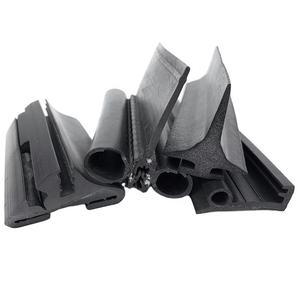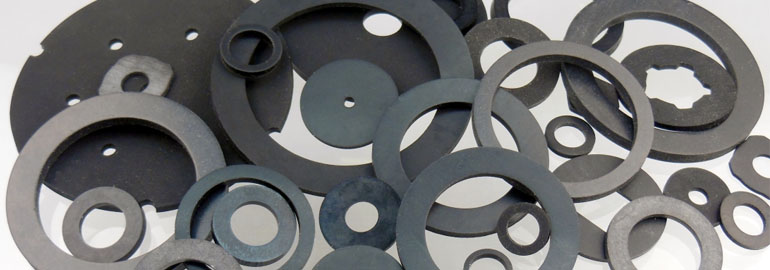Industrial seals are crucial components in various industries, playing a vital role in ensuring the proper functioning and safety of equipment and systems. These seals are designed to prevent the leakage of fluids, gases, or particles while also serving to contain pressure, protect components from contaminants, and provide essential sealing in a wide range of industrial applications. In this comprehensive description, we will delve into the types, materials, applications, functions, and benefits of industrial seals.
Types of Industrial Seals:
- O-Rings: These are circular seals with a round cross-section, typically made of rubber or elastomeric materials, which are used to create a seal between two mating surfaces. O-rings are ubiquitous in hydraulic and pneumatic systems.
- Gaskets: Gaskets are flat or profiled seals made from various materials like rubber, cork, or metal. They are placed between two mating surfaces and are commonly used in flanges, pipes, and machinery.
- Lip Seals (Oil Seals): Lip seals consist of a flexible lip that prevents the leakage of lubricants or fluids from rotating shafts, making them essential in automotive and machinery applications.
- Mechanical Seals: These are advanced sealing devices used in rotating machinery, such as pumps and compressors, to prevent the leakage of process fluids. They consist of stationary and rotating components.
- Diaphragms: Diaphragms are flexible, sheet-like seals that deform to isolate two substances while allowing movement or pressure variations. They find application in pumps, valves, and control systems.
- Braided Packing: Braided packing is a type of seal made from flexible materials like graphite, PTFE, or carbon, used to seal gaps or clearances in rotating equipment, valves, and pumps.
- Bellows Seals: Bellows seals consist of accordion-like structures that accommodate axial and angular movement. They are employed in applications requiring both sealing and flexibility.
- Cassette Seals: Cassette seals are preassembled, unitized sealing solutions, often used in rotating equipment like pumps and mixers.
Materials for Industrial Seals:
Industrial seals are made from a wide range of materials, including:
- Elastomers (Rubber): Commonly used for O-rings and gaskets, elastomers include materials like Nitrile (Buna-N), Viton, EPDM, and silicone, each offering unique properties.
- Thermoplastics: Materials like PTFE (Teflon) and UHMW (Ultra-High-Molecular-Weight Polyethylene) are suitable for their chemical resistance and low friction properties.
- Metals: Metal seals, such as copper, aluminum, and stainless steel, are used in high-temperature and high-pressure applications.
- Composites: Materials like graphite or reinforced plastics are employed for their excellent chemical resistance and mechanical properties.
Applications of Industrial Seals:
Industrial seals are used in a wide range of applications across various industries, including:
- Hydraulics and Pneumatics: O-rings and gaskets in hydraulic systems, pneumatic cylinders, and valves.
- Oil and Gas: Mechanical seals and gaskets in pumps, valves, and pipelines.
- Automotive: Lip seals, O-rings, and gaskets in engines, transmissions, and suspension systems.
- Chemical Processing: Seals in reactors, mixers, and tanks to prevent leaks and contamination.
- Food and Beverage: Food-grade seals in processing equipment to ensure product safety and hygiene.
- Aerospace: Seals in aircraft engines, hydraulic systems, and avionics.
- Pharmaceuticals: Seals in pharmaceutical manufacturing and packaging equipment to maintain product integrity.
- Power Generation: Seals in turbines, generators, and nuclear power plants.
Functions of Industrial Seals:
- Leak Prevention: The primary function of industrial seals is to prevent the unwanted escape of fluids, gases, or particles.
- Pressure Containment: Seals help maintain the desired pressure within a system, ensuring efficient operation.
- Contamination Protection: Seals safeguard equipment and processes from contamination by preventing external substances from entering.
- Temperature and Chemical Resistance: Depending on the material used, seals offer resistance to extreme temperatures and various chemicals.
- Friction Reduction: Some seals reduce friction, improving the efficiency and lifespan of mechanical components.
Benefits of Industrial Seals:
- Reliability: Industrial seals ensure reliable operation of equipment by preventing leaks and maintaining system integrity.
- Safety: Seals in critical applications, such as those in the oil and gas industry, contribute to the safety of personnel and the environment.
- Efficiency: Proper seals reduce energy wastage and enhance the efficiency of machinery.
- Environmental Protection: Seals prevent the release of harmful substances, contributing to environmental protection and regulatory compliance.
- Reduced Maintenance Costs: Well-designed and properly installed seals can extend the lifespan of equipment and reduce maintenance expenses.
In conclusion, industrial seals are integral components in a wide range of industries, serving essential functions in leak prevention, pressure containment, and contamination protection. The choice of seal type and material is critical, as it depends on the specific application and the surrounding conditions. Industrial seals play a pivotal role in ensuring the reliability, safety, and efficiency of industrial processes and equipment.






